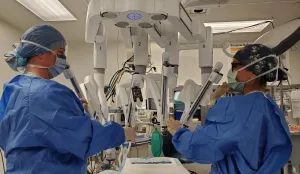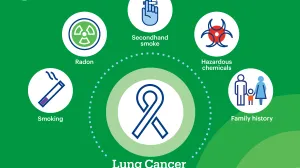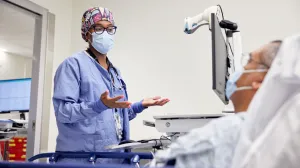
Lung cancer is one of the most common and deadly forms of cancer. It’s the leading cause of cancer deaths in both men and women and one of the toughest to treat. Our lungs are delicate and hard for surgeons to access due to their location within the chest cavity—a tight space protected by the rib cage and filled with vital organs. Thoracic surgery, which takes place in the area between the lungs, trachea and diaphragm, has long been considered high-risk.
The good news is that technology and minimally invasive procedures have significantly improved both testing and treatment. These advances lower the risk of complications while increasing precision and speeding up recovery. Tufts Medicine is at the forefront of these innovations, using robotic-assisted techniques to biopsy lung tissue and remove cancerous growths with accuracy.
Lung cancer is typically diagnosed by testing nodules or tumors discovered during imaging tests such as a CT scan or X-ray. With robotic-assisted bronchoscopy, surgeons can reach and biopsy tiny, hard-to-access nodules almost anywhere in the lung. Because it’s minimally invasive, robotic bronchoscopy involves less trauma to the lung and minimal blood loss compared to older techniques. If cancer is detected and surgery is recommended, robotic-assisted procedures offer unparalleled precision.
“Advances in minimally invasive robotic surgery have changed the field dramatically,” says Lana Schumacher, MD, Chief of Thoracic Surgery at Tufts Medical Center. She recalls a time when surgeons had to split the ribs to reach the lungs—a painful procedure that led to long hospital stays, extended recovery and more complications, such as pneumonia.
Robotic-assisted surgery now uses flexible, fingertip-sized instruments guided by the surgeon, paired with high-definition 3D imaging magnified up to 10x. This technology is a game changer in lung cancer surgery, where precision is key to removing cancerous tissue while preserving the fragile lung. The added flexibility also helps surgeons access difficult areas, like the back of the lungs or upper lobes. “The precision makes all the difference,” says Dr. Schumacher.
This precision also improves recovery. Instead of spending one to two weeks in the hospital, most patients stay just one to two days. Smaller incisions and less trauma to the chest wall often mean less post-surgical pain than with traditional open surgery.
I can perform a complicated surgery, and, in some cases, the patient doesn’t even realize they’ve had surgery. They can go right back to their daily activities.
Lana Schumacher, MD, Chief of Thoracic Surgery at Tufts Medical Center
“We’re so focused on new surgical techniques, technology and other innovations because they are saving lives,” says Dr. Schumacher. “It’s so important to have different types of treatments. From being able to identify tumors through screening and biopsy to being able to treat and remove them through minimally invasive surgery, our patients have more options.”

